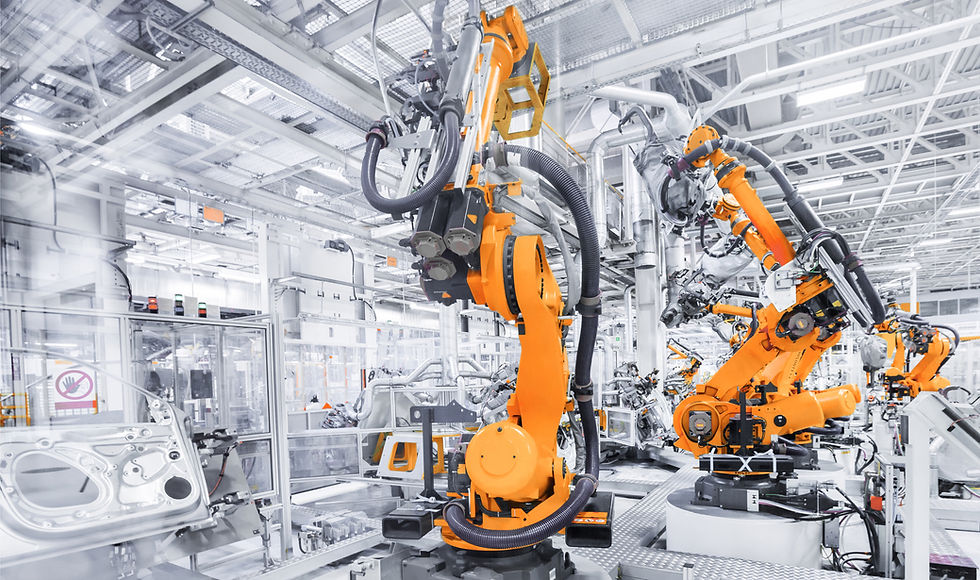Maximizing Efficiency: Implementing Industry 4.0 in Small Metal Fabrication Businesses
- Krish Jay
- Nov 18, 2024
- 2 min read
The metal fabrication industry is experiencing significant changes due to Industry 4.0, the fourth industrial revolution, leading to increased efficiency in their daily operations.

This new era is characterized by the fusion of physical and digital technologies, creating smart factories that are more efficient, agile, and responsive than ever before. While the concept of Industry 4.0 might seem daunting and exclusive to large corporations, small businesses can also reap significant benefits from adopting these technologies.
Here's how small businesses can leverage Industry 4.0 to enhance efficiency in their production processes:
1. Embrace Automation:
Robotic Process Automation (RPA): Automate repetitive tasks like data entry, invoicing, and scheduling, freeing up employees for more complex and creative work.
Collaborative Robots (Cobots): Unlike traditional industrial robots, cobots are designed to work alongside humans, assisting with physically demanding or intricate tasks, improving both productivity and workplace safety.
2. Data-Driven Decision Making:
Internet of Things (IoT) sensors: Collect real-time data on machine performance, production output, and environmental conditions. This data provides valuable insights into potential bottlenecks, maintenance needs, and areas for optimization.
Data analytics platforms: Analyze the collected data to identify trends, predict potential issues, and make informed decisions to improve efficiency and reduce downtime.
3. Optimize Supply Chain Management:
Cloud-based inventory management systems: Track inventory levels in real-time, automate reordering processes, and minimize storage costs.
Predictive maintenance: Use data analysis to anticipate equipment failures and schedule maintenance proactively, reducing costly downtime.
4. Enhance Product Quality:
Digital twins: Create virtual replicas of physical products and production processes to simulate and optimize performance before actual production.
Computer vision systems: Automate quality inspection, identifying defects with greater accuracy and speed than manual inspection.
5. Additive Manufacturing (3D Printing):
Rapid prototyping: Create prototypes quickly and inexpensively, accelerating product development cycles.
On-demand manufacturing: Produce customized parts and products in small batches, reducing waste and inventory costs.
Getting Started with Industry 4.0:
Start small: Begin by identifying specific areas where technology can address existing challenges or bottlenecks.
Seek expert advice: Consult with technology providers or industry experts to determine the best solutions for your business needs.
Invest in training: Equip your workforce with the skills and knowledge to operate and maintain new technologies.
Prioritize cybersecurity: Implement robust security measures to protect sensitive data and prevent cyberattacks.
Real-World Examples:
A small bakery uses IoT sensors to monitor oven temperatures, ensuring consistent product quality and reducing energy waste.
Aston Precision PTY LTD, a metal fabrication shop in Melbourne implements a cloud-based inventory management system to optimize stock levels and reduce lead times.
A small clothing manufacturer uses 3D printing to create custom designs and offer personalized products to customers.
By embracing Industry 4.0 technologies, small businesses can gain a competitive edge, improve efficiency, and drive growth in today's dynamic market.
We at Aston Precision is always at the forefront of embracing new tech and innovative ideas. We use cloud based services to efficiently allocate materials in our laser cutting, inventory management and credit allocation decision making. By doing this we are able to provide our customers with the best possible experience in their metal fabrication journey.
Contact us today at sales@astonprecision.com to discuss your next astonishing project!







Comments